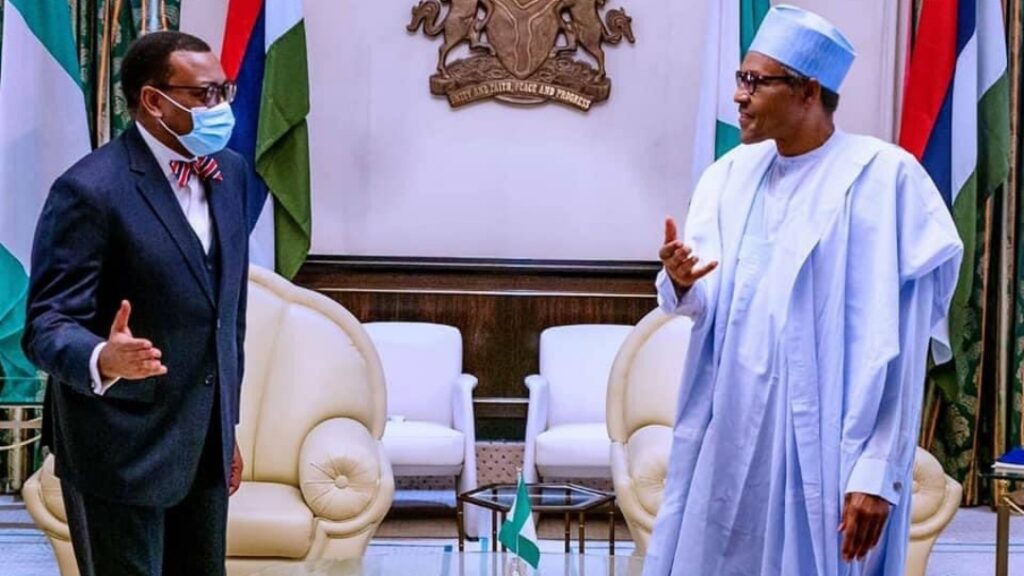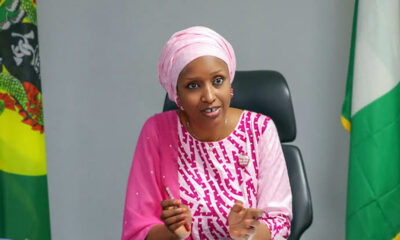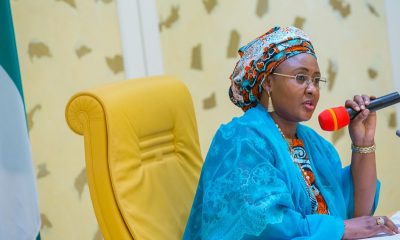Business
AfDB disagrees with Buhari, finance minister on Nigeria’s debt challenge

- Says Africa should be producing and not begging for vaccines
African Development Bank has affirmed that Nigeria has a debt challenge, with debt service gulping 73 per cent of government revenue.
President of the AfDB, Dr Akinwumi Adesina, gave the bank’s position, which is completely different from that President Muhammadu Buhari and Minister of Finance, Budget and National Planning, Zainab Ahmed, who interpret the challenge before the nation as revenue generation.
Adesina spoke on Monday at a mid-term retreat for ministers. President Buhari and Vice President Yemi Osinbajo were among the audience.
In his budget presentation to the National Assembly, Buhari in trying to assuage concerns over rising debt said, “Some have expressed concern over our resort to borrowing to finance our fiscal gaps. They are right to be concerned. However, we believe that the debt level of the Federal Government is still within sustainable limits. Borrowings are to specific strategic projects and can be verified publicly…
“Our target over the medium term is to grow our Revenue-to-GDP ratio from about eight per cent currently to 15 per cent by 2025. At that level of revenues, the Debt-Service-to-Revenue ratio will cease to be worrying. Put simply, we do not have a debt sustainability problem, but a revenue challenge which we are determined to tackle to ensure our debts remain sustainable”.
But arguing from a different perspective, Adesina said Nigeria’s debt service to revenue ratio was high at 73 per cent and urged the government to decisively tackle the challenge.
“Nigeria must decisively tackle its debt challenges. The issue is not about debt-to-GDP ratio, as Nigeria’s debt-to-GDP ratio at 35 per cent is still moderate. The big issue is how to service the debt and what that means for resources for domestic investments needed to spur faster economic growth.
“The debt service to revenue ratio of Nigeria is high at 73 per cent. Things will improve as oil prices recover, but the situation has revealed the vulnerability of Nigeria’s economy. To have economic resurgence, we need to fix the structure of the economy and address some fundamentals.
“Nigeria’s challenge is revenue concentration, as the oil sector accounts for 75.4 % of export revenue and 50 % of all government revenue.”
As of June 30, 2021, the country’s external obligations stood at $33.468 billion, according to the Debt Management Office (DMO).Domestic debt was $53.2 billion. In naira terms total national debt was N35.5 trillion.
Akinwumi further stated that what was needed for sustained growth and economic resurgence is to remove the structural bottlenecks that limit the productivity and the revenue earning potential of the huge non-oil sectors.
“Nigeria should significantly boost productivity and revenues from its non-oil sector, with appropriate fiscal and macroeconomic policies, especially flexible exchange rates that will enhance international competitiveness.”
The AfDB President further said Africa should be producing and not begging for vaccines.
According to him, the African Development Bank will invest $3 billion in support of local pharmaceutical industries in Africa, including in Nigeria.
“Nigeria must build quality health care systems that will protect its population, today and well into the future.
“Nigeria must also build world-class local pharmaceutical industries, able to effectively tackle the production of therapeutic drugs and vaccines.
“Nigeria must revamp its local pharmaceutical industry and launch strategic investments for local vaccine manufacturing. Africa should not be begging for vaccines; Africa should be producing vaccines.
Adesina also further stated the government should not be decongesting the ports in Nigeria, rather “we should be transforming the ports.
“This must start with cleaning up administrative bottlenecks, most of which are unnecessary with multiple government agencies at the ports, high transaction costs or even plain extortions from illegal taxes, which do not go into the coffers of the government.
“Nigeria should rapidly modernise and transform its ports. Ports are not there for revenue generation. They are for facilitating business and exports, and stimulating industrial manufacturing, and competitiveness of local businesses and exports,” Adesina said.
Entertainment
NRC, Entertainers Finalise Plans for 2026 Valentine Train Ride

NRC, Entertainers Finalise Plans for 2026 Valentine Train Ride
A team of leading Nigerian artistes and entertainment executives has paid a courtesy visit to the Managing Director of the Nigerian Railway Corporation (NRC), Kayode Opeifa, ahead of the 2026 Valentine Love Train experience.
The delegation included celebrated musician Sunny Neji, Managing Director of Ojez Entertainment Limited, Joseph Odobeatu, and veteran vocalist Yinka Davies.
The high-profile visit formed part of final preparations for the Valentine-themed train ride scheduled for Saturday, February 14, 2026, at the Mobolaji Johnson Train Station.
Dr. Opeifa received the artistes and commended the creative industry for choosing the national rail system as the venue for the annual Valentine event. He noted that the partnership reflects growing public confidence in the corporation’s safety standards, operational improvements, and renewed focus on customer experience.
READ ALSO:
- 2027 General Elections: INEC Announces February 20 for Presidential Poll
- EFCC Nabs Three in Borno Over Viral ₦500 Naira Mutilation Video
- Omokri Accuses El-Rufai of Rights Abuses During Kaduna Governorship
“The 2026 edition aims to deliver an unforgettable experience while deepening public engagement with the rail service,” Opeifa said, reaffirming the NRC’s commitment to providing secure and efficient transport for passengers during special events.
Organisers disclosed that this year’s edition will feature an expanded entertainment lineup, including performances and appearances by Charles Inojie, Yinka Davies, Sunny Neji, and Segun Arinze. Guests are expected to enjoy live music, comedy, a couple’s game show, fashion showcases, and special performances throughout the Lagos–Ibadan–Lagos train ride, culminating in a Valentine banquet ball.
The Valentine Love Train has in recent years become a fixture on the NRC’s festive calendar, attracting couples, families, and leisure seekers with its blend of travel, romance, and entertainment. The initiative also aligns with ongoing efforts by the corporation to promote rail transportation as a viable and enjoyable alternative for intercity travel.
With final logistics being fine-tuned, organisers say the 2026 edition promises to combine safety, comfort, and premium entertainment for participants.
NRC, Entertainers Finalise Plans for 2026 Valentine Train Ride
Auto
Lagos Motor Fair, Autoparts Expo to begin March 17, targeting Investment, Industry Growth

Lagos Motor Fair, Autoparts Expo to begin March 17, targeting Investment, Industry Growth
The 20th edition of the Lagos International Motor Fair and the 13th Africa Autoparts Expo is set to spotlight investment, technology transfer and industry collaboration as organisers intensify efforts to position Nigeria as a major automotive hub in West Africa.
The three-day event, which will also incorporate the Africa Motorcycle and Tricycle Expo, is scheduled to hold from March 17 to 19, 2026, at the Federal Palace Hotel in Lagos.
Organisers said the upcoming edition would focus strongly on accelerating the development of the country’s automotive sector by creating platforms that connect global manufacturers with local industry players.
“Nigeria has all it takes to become a global automotive industry giant,” the organisers stated, noting that the fair remains a strategic contribution toward driving growth despite prevailing industry challenges.
Chairman of the Organising Committee, Ifeanyichukwu Agwu, said the exhibitions had over the years evolved into a key platform for attracting investment into automobile spare parts and accessories manufacturing while strengthening aftermarket activities across the region.
“We have consistently used these events to attract investment into auto components manufacturing and to showcase the enormous capacity and potential of this critical sector of the economy,” he said.
READ ALSO:
- First Daughter of Murtala Muhammed Reflects on Life Without Father, Preserving His Legacy
- Anambra Police Arrest Motel Owner, Two Others Over Firearms, Drug Trafficking
- 2 Nigerians Killed While Fighting for Russian Army in Ukraine War
Agwu, who also serves as Managing Director of BKG Exhibitions Limited, disclosed that the 2026 edition would place emphasis on business-to-business engagement between original equipment manufacturers (OEMs) and auto parts dealers from Nigeria and neighbouring countries.
According to him, the goal is to foster partnerships capable of leading to the establishment of component manufacturing plants locally.
He added that the exhibition is expected to support government policies aimed at building a sustainable automotive industry by stimulating the emergence of companies involved in component production.
Calling for policy adjustments, Agwu urged the Federal Government to prioritise spare parts and components manufacturing over vehicle assembly, arguing that deeper technology transfer and innovation occur within the components segment.
“Spare parts manufacturing is where real technology transfer occurs. It involves precision engineering, planning and innovation—far beyond the coupling processes involved in assembly,” he said, while also advocating a review of the existing automotive policy to better support local production.
Despite the challenges associated with hosting large-scale industry events, Agwu reaffirmed the organisers’ commitment to sustaining the platform, warning that neglecting the automotive sector could have far-reaching consequences for the economy and employment.
The organisers said more than 100 original components manufacturers from countries including China, India, South Korea, South Africa, Singapore and Turkey, alongside major automobile distribution and manufacturing companies operating in Nigeria, are expected to participate.
In addition to product exhibitions, the event will feature seminars and technical workshops focusing on policy, investment opportunities, technology transfer and industry best practices, with each day structured to deliver value to exhibitors, investors, policymakers and other stakeholders.

Lagos Motor Fair, Autoparts Expo to begin March 17, targeting Investment, Industry Growth
Business
Naira Could Trade Below ₦1,000/$ With Dangote Refinery at Full Capacity — Otedola

Naira Could Trade Below ₦1,000/$ With Dangote Refinery at Full Capacity — Otedola
Billionaire businessman Femi Otedola has projected that the naira could strengthen to trade below ₦1,000 per US dollar as the Dangote Petroleum Refinery achieves full operational capacity. The prediction comes as Nigeria anticipates a major boost in domestic fuel production, potentially reducing import dependence and easing pressure on the foreign exchange market.
Otedola made the projection in a post on X, congratulating Aliko Dangote on the refinery reaching its designed processing capacity of 650,000 barrels per day (bpd). He described the milestone as a historic moment for Nigeria’s energy sector, saying it could positively impact the naira exchange rate, foreign reserves, and overall economic stability.
According to Otedola, the refinery’s capacity to produce up to 75 million litres of Premium Motor Spirit (PMS) daily positions Nigeria to meet domestic fuel demand and even generate surplus for export. He highlighted that this would reduce the country’s reliance on imported petroleum products, which historically exerted heavy pressure on the naira and foreign exchange resources.
READ ALSO:
- Adeyanju Urges EFCC, DSS to Probe El-Rufai Over Alleged Corruption, Insecurity in Kaduna
- Granite-Laden Truck Kills Motorist, Leaves Wife Critically Injured in Lekki–Ajah Crash
- City Boy Movement Receives Bus Donations from Zenco, Obi Cubana for Tinubu’s Campaign
“With domestic refining now firmly underway after decades of reliance on imports, pressure on the foreign exchange market should ease significantly, potentially pushing the naira below ₦1,000/$ before year-end,” Otedola said. He also noted that the EFCC and monetary authorities’ support in maintaining a conducive economic environment would complement these gains.
The Dangote Refinery, located in the Lekki Free Zone, Lagos, is Africa’s largest single-train refinery. Experts say that reaching full production will conserve billions of dollars previously spent on importing refined petroleum products and strengthen Nigeria’s foreign exchange reserves. Plans are also underway to expand refining capacity to 1.4 million bpd, with increased production of petrochemicals like polypropylene and linear alkyl benzene, further reducing industrial import dependence.
Economic analysts have welcomed the refinery’s milestone but caution that naira stability will still depend on broader macroeconomic reforms, oil prices, foreign capital inflows, and Central Bank of Nigeria (CBN) policies. Nevertheless, Otedola’s projection reflects renewed optimism that domestic refining capacity could be a turning point for the Nigerian economy, energy security, and the foreign exchange market.
Naira Could Trade Below ₦1,000/$ With Dangote Refinery at Full Capacity — Otedola
-

 metro2 days ago
metro2 days agoIKEDC Sets Feb 20 Deadline for Customers to Submit Valid IDs or Face Disconnection
-

 Education2 days ago
Education2 days agoSupreme Court Affirms Muslim Students’ Right to Worship at Rivers State University
-

 metro1 day ago
metro1 day agoLagos Police Launch Manhunt for Suspect in Brutal Ajah Murder
-

 News1 day ago
News1 day agoAso Rock Goes Solar as Tinubu Orders National Grid Disconnection
-

 Business2 days ago
Business2 days agoNaira Could Trade Below ₦1,000/$ With Dangote Refinery at Full Capacity — Otedola
-

 metro3 days ago
metro3 days agoKwara, Katsina Bloodshed: TMC Condemns Attacks, Dismisses ‘Jihadist Preacher’ Claims
-

 metro2 days ago
metro2 days agoArmy University Professor Dies in Boko Haram Captivity After Nearly One Year
-

 International2 days ago
International2 days agoTrump Halts Minnesota Immigration Crackdown After Fatal Shootings, Protests















